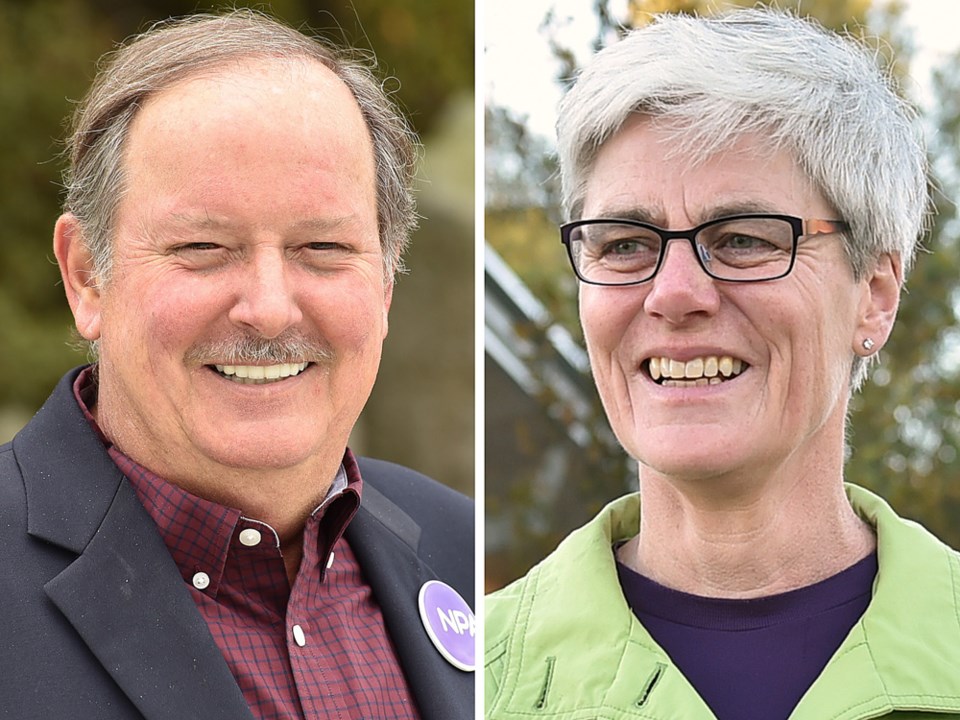In a city grappling with sky-high housing costs and a shrinking population of school children, the new Vancouver School Board has its work cut out.
Vancouver voters returned a split board, as has been the case for the past several years. This time, voters chose three Green trustees, three NPA trustees, and one each for Vision, COPE and OneCity.
The Green Party’s Janet Fraser has been the board’s chairwoman and said she is willing to continue in that role. If she does, she will be overseeing four returning and five new trustees, six women and three men.
“As Greens, we’ve always said we will work with whoever is elected,” Fraser said. “It’s spread across different parties and different ideas and that will make for very interesting discussions.”
Fraser Ballantyne, the lone returning NPA trustee, said working with the new board will be challenging because of the “thorny issues” ahead, but that debating the varying viewpoints will be positive for the community.
Voters stayed away from trustee candidates who were against Vancouver’s sexual orientation and gender policy.
This year the board sold the land underneath Lord Roberts Annex in the West End to B.C. Hydro for up to $75 million, which will be used to pay for two new schools. Fraser says she doesn’t know of any more land deals on the horizon, but this fall, trustees will consider providing workforce housing for people who work in schools.
The district has had a challenge keeping teachers, who have said it’s too expensive to live in Vancouver.
Ballantyne said revenue to support schools could be generated through staff housing, specifically by using developers’ community amenity contributions.
“We have land. We could leverage the work force housing in some way,” Ballantyne said. “At a high level, I support that.”
The new board faces a controversial catchment boundary review, which is inextricably linked both seismic upgrades and possible school closures. A review was launched last year, but it didn’t include a plan to keep siblings together and parents were not impressed. It’s been sent back to staff for a second look.
Fraser is pleased with the progress being made to upgrade the city’s schools to be safe in earthquakes — 44 are at risk with no plan in place, another 20 are at some stage of planning or construction — but says trustees are hearing from parents who are very upset.
They’re upset that the new schools are as much as 30 per cent smaller, and they’re upset about students being moved to far away schools during construction. Speaking only as a trustee, not as board chair, she says the board appears to have very little decision-making ability on these projects.
“It seems as though we can approve the project office’s choice or not have a project,” Fraser said.
Ballantyne said the city, parks board and school board could work together to speed up seismic upgrades.
“[I would] encourage the city to prioritize seismic upgrades for schools, just as we have for affordable housing and for homelessness, “ Ballantyne said.
Fraser said the Green caucus across Vancouver, which elected nine of 10 candidates, will work together to share ideas to tackle subjects like affordable housing.
The province is doing a review of education funding and Fraser says she worries that Vancouver will get less funding once the review is complete. This year the board will create a needs budget — an expression by a school board about the funding it would actually need to provide a proper education to all students — which could also prove contentious.
Fraser is hoping to put more of an emphasis on reconciliation with Indigenous people, and says she would like the district to have a formal plan.
Now that the board has a four-year mandate, Fraser says it will be able to take a more long-term view of issues such as the elementary school music program.
“I think we should come at that from an educational point of view — appreciating that there are budget implications — but because that issue comes up quite frequently, it’s time for the board to make a decision,” Fraser said.
Ballantyne also mentioned music and art education, saying he would like the board to create partnerships with individuals, corporations and philanthropic organizations to generate revenue to bring more music and art into schools.
With disparate perspectives and contentious, high-stakes issues at stake, the next four years promise an interesting ride at VSB.
Tracy Sherlock writes about education and social issues for the Courier. Reach her at [email protected].



